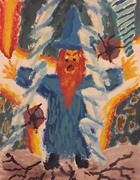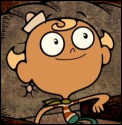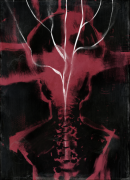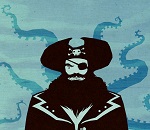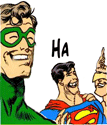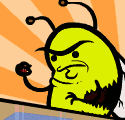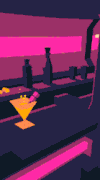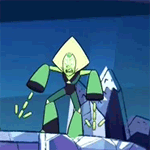|
 Hawk released on October 7th, 2014!!  Steven Brust is an American author of fantasy, known best for his stories set in the fantasy world of Dragaera, and especially his Vlad Taltos series, which follows the life of a human assassin who works for a Mafia-type organization in an empire ruled and mostly populated by elves. Brust published the first novel in this series, Jhereg, back in 1983 and has been steadily releasing followups in the series, of which the 14th book Hawk is being released this week. Aside from the Vlad Taltos novels, Brust has also written a series loosely called the Khaavren Romances, a sort of ďprequelĒ series set a few centuries earlier in the same world, written with a style that plays heavy homage to The Three Musketeers. Brust has also published a few standalones along with books written in collaboration with other authors, including most recently The Incrementalists along with Skyler White.  The Vlad Taltos series is definitely the place to start with Brust (although you canít go wrong with his other books either). The seriesí titular character, Vlad Taltos, is an assassin and low-level boss working for a Mafia-like organization called the Jhereg, operating out of the capital city of the Dragaeran Empire. Most of the residents of this empire are Dragaerans, who are taller than humans and live much longer (a thousand years or more is not an uncommon lifespan). Vlad is a rather rare exception as a human, whom the Dragaerans call ďEasternersĒ since most of them live far in the East, and grew up in the Empire as a minority citizen, experiencing harassment and disdain from Dragaerans all his life. He channeled his resentment of Dragaerans into a career of beating them up and eventually killing them for money, which is where he starts off in the series. As a member of the Jhereg, one of seventeen Great Houses of the Empire, Vlad Taltos is considered a citizen of the Empire, and like all citizens he has access to the Imperial Orb, an artifact that guards the Empress and enables sorcery to all citizens simply by existing. As such, things like teleportation and resurrection are not only possible but commonplace in the world of Dragaera, although these things have their limits. On top of being a sorcerer of middling ability, Vlad also practices witchcraft, an art developed by Easterners. While sorcery is workmanlike, a lever that can be pulled to make something happen, witchcraft is a lot more subtle and requires preparation on the part of its practitioners. Some of the best scenes in the novels involve Vlad conducting a spellcasting ritual.  Speaking of witchcraft, Vlad Taltos can hardly be mentioned without including his wise-cracking familiar, Loiosh, who maintains a psychic link with Vlad at all times and assists him in nearly everything. Loiosh is a jhereg or flying reptile which the Jhereg organization is named after. Having grown up around a Mafia enforcer, Loiosh has picked up some of the trappings of a henchman himself, referring to Vlad affectionately as ďbossĒ and busting his balls throughout the series. Vlad has a few other allies in the books too, such as the warlord-wizard Morrolan who lives in a flying castle, or the undead vampire (but actually quite nice) Sethra Lavode. Brust likes to change up the style and tone of these novels between them, but for the most part the books are told from the first-person point of view of Vlad. Each book tends to jump around in chronology, such that the second book in publication order (Yendi) actually comes before the first book (Jhereg) in chronological order. This often means that what was a throwaway reference to an earlier happening in Vladís life in one book may turn out to be a major plot point (or even an entire novel) later in the series. There are even a few twists that are foreshadowed in earlier books and revealed in later ones. In my opinion the best way to read the books is in publication order, which is thankfully pretty easy to do thanks to the recent anthologies containing two or three of the Vlad books at once.  The books in publication order are: The Book of Jhereg - featuring Jhereg, Yendi and Teckla The Book of Taltos - featuring Taltos and Phoenix The Book of Athyra - featuring Athyra and Orca The Book of Dragon - featuring Dragon and Issola The Book of Dzur - featuring Dzur and Jhegaala Iorich Tiassa Hawk The newest book in the series is Hawk and it should be out everywhere this week. Iím waiting on my Amazon shipment still, from what Iíve heard the book is going to advance the plot in a big way and possibly set up for the seriesí impending and inevitable ending. You can read the first chapter as a preview by following the link above.  Iíve already typed out a lot of words so Iíll make only a brief mention of the Khaavren Romances which could take up a thread all on their own. These books are set nearly a millenium before the Vlad Taltos series, and follow a young nobleman from the House of Tiassa named Khaavren, as he joins the newly-formed Phoenix Guards with hopes of protecting the Empire and finding advancement within its ranks. The series starts off with The Phoenix Guards, describing a young Khaavrenís adventures with his friends Aerich, Tazendra and Pel, and continues with Five Hundred Years After, which is set, uhh, five hundred years after the events in The Phoenix Guards. What distinguishes these books is the unique style Brust uses; instead of a character narrating, the books are instead written by a fictional author named Paarfi of Roundwood in a style that pays homage to Alexander Dumasí Three Musketeers in a very tongue-and-cheek way. The style is a huge departure from the Vlad books but donít let that deter you from reading this series, as all of the books are very good, and Five Hundred Years After especially may be one of the best fantasy novels Iíve ever read. In closing, you should really give these books a shot! The Vlad books are short, very readable, and incredibly fun. They follow the Rule of Cool throughout; I had to leave things like soul-drinking weapons and interdimensional demigods out just to keep this post length manageable. Steven Brust is a great and in my opinion very underrated author, so check him out if you havenít yet!  Please keep it light on spoilers for the first page!! Also please donít spoil Hawk (duh)! Please keep it light on spoilers for the first page!! Also please donít spoil Hawk (duh)! 
The Ninth Layer fucked around with this message at 01:45 on Oct 7, 2014 |
|
|
|

|
| # ? Apr 25, 2024 05:31 |
|
The Ninth Layer posted:Steven Brust is a great and in my opinion very underrated author, so check him out if you havenít yet! He really, really is, to the point where it's baffling. I can think of half a dozen reasons why that might be (not "epic" fantasy length, non-traditional series structure, urban setting, politics that aren't blandly acceptable to neckbeard manchildren, grimdark bits that are actually grim and dark), but given the crap that's way more popular that hits pretty much all of those marks, I don't understand it. He has gotten pretty self-indulgent in how he structures each book compared to the first two, but at least he has a drat structure, and he executes ridiculously well.
|
|
|
|
Steven Brust is literally the best living and working author, and you owe it to yourself to read the Dragaera books at least. One book you missed (but have in your collection) is Brokedown Palace, a novel set in Fenario that suffers for originally being a Marxist allegory.
|
|
|
|
Oh wow, this is a blast from the past for me. I read the Vlad Taltos series years ago and really liked them, but somehow I'd completely forgotten them until now. I'm going to have to reread the series before I read the new novels out!
|
|
|
|
Holy poo poo, I didn't realize Jhereg was written in '83. That book's as old as I am. It's aged really really well, too; I re-read them all a few weeks back in preparation for Hawk and it's still a great read.
|
|
|
|
Great OP. I haven't read a ton of Brust, but I love most of what I have read. He is a phenomenally smart person, and his sense of what's "cool" in fantasy is brilliant. He also has a genuinely sharp political acumen. Dragaera is politically and socially believable, and it makes the stories feel much more meaningful. The Orb is such a clever idea. Usually mysterious and powerful magical artifacts are just presented as Doomsday device MacGuffins. Now, there is plenty of that in Brust's stories as well, but he has more originality than most, so instead he dreamed up an artifact that ties an empire together in a very functional and practical way. The empire dominates the world of Dragaera, and the orb dominates life in the empire. It almost feels like a science fiction story where one faction has some kind of advanced technology that no one else has, but Brust transposes it deftly into a fantasy setting. There are so many nifty tidbits like that. Good stuff.
|
|
|
|
The Ninth Layer posted:Iíve already typed out a lot of words so Iíll make only a brief mention of the Khaavren Romances which could take up a thread all on their own. These books are set nearly a millenium before the Vlad Taltos series, and follow a young nobleman from the House of Tiassa named Khaavren, as he joins the newly-formed Phoenix Guards with hopes of protecting the Empire and finding advancement within its ranks. One thing that should be mentioned about the Khaavren Romances: Dragaerans have an extremely long lifespan; because of this, the Khaavren Romances serve as a sort of prequel about the origins of characters from the main books like Morrolan, Aliera, and Teldra despite the fact that they take place roughly a thousand years before the start of Jhereg. Hell, Morrolan isn't considered middle-aged for a Dragaerean by the events of Jhereg.
|
|
|
|
I've got the Book of Jhereg, free to a good home (though it'll be a few weeks before I can go home and dig it out the attic). Cover the UK postage and it's yours!
|
|
|
|
Is this Dragonlance-level stuff or bit deeper?
|
|
|
|
Phenomenally deeper. Because they are written conversationally with tonal nods to pulp noir it's easy to think of them as light, but the juxtaposition of style and setting is pretty unique and there is a lot going on beneath the surface. I think my most substantive criticism is that Brust clearly wants to push himself as an author and try something different in each new book, which means there are a couple of books which (IMO) completely misfire for me personally. But the worldbuilding is exemplory and his best books elevate the entire series. There are a lot of subtle things which come out on re-reads - it's the kind of series that is very tempting to keep delving into, as later books recontextualise characters and events from early ones and some parts of the world need to be detectived out a bit. The Khaavren books are even more unusual and extremely clever, particularly if you are familiar with Dumas. They are best read after a few of the Vlad books. Brust pulls off my favourite trick in fiction which is to write with wit and humour but still manage to instil characters and story with pathos and depth. I think he is a unique author who blends Zelazny, Lieber and Moorcock with romance authors like Dumas and Sabatini. He has a clear interest in politics and history from an marxist bent (marxism as social science and history as much as political theory), but he is more interested in discussing ideas through the books than promoting an agenda. I strongly recommend reading at least Jhereg, Yendi, tough it out through Teckla, then Phoenix. They are short books but I think Phoenix is probably the best book of the series so it's worth getting there if you can.
|
|
|
|
Blamestorm posted:The Khaavren books are even more unusual and extremely clever, particularly if you are familiar with Dumas. They are best read after a few of the Vlad books. The Khaavren books were originally published after Phoenix (and Athyra for book 2, and Orca/Dragon/Issola for book 3), so I'd recommend reading all of them right after Phoenix before going back to Vlad. Also, read in publication order: Jhereg (1983) Yendi (1984) Teckla (1987) Taltos (1988) Phoenix (1990)
|
|
|
|
You can read the Khaavren series whenever really, it's not essential to the Vlad books at all (though they make for really great backstory) and they're worth reading on their own merits.Blamestorm posted:Phenomenally deeper. Because they are written conversationally with tonal nods to pulp noir it's easy to think of them as light, but the juxtaposition of style and setting is pretty unique and there is a lot going on beneath the surface. I think my most substantive criticism is that Brust clearly wants to push himself as an author and try something different in each new book, which means there are a couple of books which (IMO) completely misfire for me personally. But the worldbuilding is exemplory and his best books elevate the entire series. There are a lot of subtle things which come out on re-reads - it's the kind of series that is very tempting to keep delving into, as later books recontextualise characters and events from early ones and some parts of the world need to be detectived out a bit. One thing I love about the series is that each book is pretty remarkably different as the series progresses. My favorite is probably Athyra, with Issola a close second, but there really isn't a book in the series I dislike. Teckla gets a lot of heat as probably the worst in the series and it's not that bad of a book in my opinion. I think one of the series' best strengths is Brust's willingness to take risks with the story and style. With that said I just got Hawk from Amazon so I'm going to disappear for the next couple of hours 
|
|
|
|
ulmont posted:The Khaavren books were originally published after Phoenix (and Athyra for book 2, and Orca/Dragon/Issola for book 3), so I'd recommend reading all of them right after Phoenix before going back to Vlad. Oops yes forgot Taltos was published before Phoenix (thought it was immediately after). And there is important stuff in Taltos so yeah better read that first.
|
|
|
|
I finished Hawk last night and really enjoyed it. I got a real kick out of the TV show (Burn Notice) reference in the intro. Now to wait two books to find out what happens next, considering what he's writing now (Vallista) takes place right before Hawk.
|
|
|
|
To Reign in Hell has my favorite golden retriever of any sci-fi or fantasy novel.
|
|
|
|
I also finished Hawk last night and really enjoyed it  The scheme in it was really well-plotted and it was fun to see how all the elements of it finally unfolded. A few things I want to talk about but I'll wait until more people have gotten a crack at it. I got a kick out of the Paarfi joke that went completely over Daymar's head; must be about the time that Phoenix Guards was released in Dragaera. The scheme in it was really well-plotted and it was fun to see how all the elements of it finally unfolded. A few things I want to talk about but I'll wait until more people have gotten a crack at it. I got a kick out of the Paarfi joke that went completely over Daymar's head; must be about the time that Phoenix Guards was released in Dragaera.
|
|
|
|
The Ninth Layer posted:I also finished Hawk last night and really enjoyed it If you mean the Pamlar University reference, that wasn't a Paarfi joke. If you mean something else, tell me because that's the only thing I can think of.
|
|
|
|
I don't have my book with me but it's the "Oh, you wish me to tell you?" line that Vlad tries to roll with but decides it's not worth explaining the joke to Daymar.
|
|
|
The Ninth Layer posted:I don't have my book with me but it's the "Oh, you wish me to tell you?" line that Vlad tries to roll with but decides it's not worth explaining the joke to Daymar. I caught that, too. I enjoyed Hawk with one minor nitpick: I feel there was little mystery for the first half of the book. Vlad told someone what he was gonna do and then...did it. Exactly. With little variation. We got both the show and the tell for several events. This may have been deliberate. There's a lot of talk about "seeing like a Hawk" in the book, in which Vlad hopes to overwhelm others with details so that they miss the big picture. I kinda feel the book tried to do that to us, the readers, also. It's a very Brust thing; tailoring the writing to the theme of the book. But I kinda feel it didn't really succeed at the misdirection until Vlad started to set up the last big showdown. Am I the only one?
|
|
|
|
|
loving Powell's in Portland, the biggest bookstore in the Pacific northwest, hosed up and won't have Hawk until Friday at the earliest  But I'll take the time that I'm not reading Hawk to say that Jhegaala is fantastically underrated and easily one of the best books in the series, and the fact that it's reception was lukewarm at best just shows how dumb most fantasy readers are. Wolfsheim fucked around with this message at 07:15 on Oct 9, 2014 |
|
|
|
Hawk: I guessed most of what was going on before the ending, and I was very pleased with how he pieced everything together. My thought process on the subject: When Vlad encounters the Orca pickpocket kid early on he invokes his Imperial privilege to suspend the punishment, and this is purely as a whim; he's not involved in the incident whatsoever. This is also a pretty serious deal, because the Phoenix Guards go from "get lost, Jhereg whiskerscum" to "yes sir no sir three bags full sir" without pausing for breath. This is where I pretty much guessed what Vlad's plan actually was. This is the first time anything like this has ever come up; Vlad never uses this power before and it's never been mentioned in regards to any other Imperial title. And one thing about Brust is that if he shows you Chekov's Gun you know that somebody's going to get shot. So from this point on I basically ran with the idea that Vlad was going to pin something massive on the Council and then use his Imperial Countship to suspend judgment on it indefinitely.
|
|
|
|
One of Brust's greatest strengths lies in his ability to understate things, deliberately, for effect. This leads to a sort of dry, self-deprecating humor that makes me laugh. Most of the noble characters in his books do this. One of the funniest things he's ever written is in The Phoenix Guards, when Khaavren and friends all go out for their first patrol and all of them end up killing their partners over a point of honor. That whole segment is hilarious.
|
|
|
|
|
Wolfsheim posted:loving Powell's in Portland, the biggest bookstore in the Pacific northwest, hosed up and won't have Hawk until Friday at the earliest coyo7e fucked around with this message at 16:43 on Oct 9, 2014 |
|
|
|
I'm still digesting Hawk. I think one of my favorite scenes is when Vlad's almost killed and proceeds to flip out about getting blood on his boots. I think I shows just how much he's changed when he lets the sorceress go unharmed and even tried to hide her identity from Morrolan. He didn't have to do that, he could have just killed her, I think in the past he might have done just that. But she wasn't a direct threat anymore so killing her would have been unjustified
|
|
|
|
platedlizard posted:I'm still digesting Hawk. I think one of my favorite scenes is when Vlad's almost killed and proceeds to flip out about getting blood on his boots. I think I shows just how much he's changed when he lets the sorceress go unharmed and even tried to hide her identity from Morrolan. He didn't have to do that, he could have just killed her, I think in the past he might have done just that. But she wasn't a direct threat anymore so killing her would have been unjustified Yeah. I think that might be a deliberate callback to the scene in Yendi where he blackmails/coerces that one Left Hand sorceress holding the anti-revification spell on Morrolan so she'll release it and betray her employers. Vlad threatens her with a morganti dagger, and then later after the revivification turns her over to Morrolan and says basically "don't take her soul, otherwise she's all yours". He comments in the over narration about how he still has nightmares about it and it's one thing that stuck with him.
|
|
|
|
That, as well as when he accidentally destroyed the soul of that other sorceress in Dzur because he didn't know Lady Teldra's abilities yet. Come to think of it Vlad's had a lot of run-ins with the Left Hand, hasn't he? Also I really can't wait to hear the backstory between Aliera and Kragar.
|
|
|
|
platedlizard posted:That, as well as when he accidentally destroyed the soul of that other sorceress in Dzur because he didn't know Lady Teldra's abilities yet. Come to think of it Vlad's had a lot of run-ins with the Left Hand, hasn't he? There have been a lot of hints about what's really going on with the Left Hand, like that it may have been a Yendi plot from the very beginning, most likely started by the Sorceress in Green. It wouldn't surprise me at all if even her actions in Issola are basically a front, and she's the #1 agent of the Jenoine, too. Hell, she could even be a god and opposed to the Jenoine for her own reasons, maybe one of Verra's sisters? Maybe just an aspiring god. What we know about how long she's been active, her power level, and her general interests make it seem pretty likely she's more than just your average Yendi magico with a strange hate-on for Easterners. Pel's reaction to her in Paths of the Dead was really interesting.
|
|
|
|
Finally made it through Hawk while spending most of the day on an airplane. It wasn't as ambitious or exciting as Tiassa but it was certainly better than Iorich so I dunno. I actually liked that his plan actually worked without a huge misstep, leaving you guessing more about how it would play out than how he would gently caress it up. All the cute little callbacks and references were there, though I thought it was funny he deliberately didn't comment when meeting Kiera and later Sethra. I'm not surprised that the focus is shifting to the Left Hand, which has been built up fairly well if you consider his previous encounters with him and how little is known of them, and along the same tact I'm glad they're finally getting into the Lady Teldra stuff because it seemed like they couldn't keep drawing it out. I liked how self-aware the Devera part was, Kragar's son and his back-and-forth with Vlad, and all of the Daymar scenes were gold. The Aliera and Warlock cameos felt a little shoehorned though, and the bits where Vlad takes an aside to explain the history behind the objects he was collecting was an interesting idea but it never quite landed as well as it could have. As far as this book's random pseudo-revelation goes, the random moment where Vlad brushes up against Tukko and something happens feels like it's going to be important at some point, but then I kind of assumed the same could be said of the Warlock and Pel and neither of those has really done much of note yet so I guess we'll see. I also hate/love that the only even halfway decent picture of Vlad is the gay pornstar one
|
|
|
|
Now that people have gotten through it, I want to talk about the mental block that Daymar runs across in Vlad's head. We know from earlier books (I think it was Dzur) that Vlad had some memories altered by Verra. It comes up again in Hawk and Vlad mentions that the experience brings up some uncomfortable memories for him that he doesn't want to dwell on. I'd need to reread Dzur just to shore up on the details. But I'd suspect that if three was any memory tampering it may have happened out East, after the events in Jhegaala. Vlad ends up going to the capital city of Fenar at the end of that one in like literally the last page, but we haven't heard much of what may have gone on there. I wonder if we're going to get another book set in the East?
|
|
|
|
The Ninth Layer posted:You can read the Khaavren series whenever really, it's not essential to the Vlad books at all (though they make for really great backstory) and they're worth reading on their own merits. Strongly disagree. You can read them almost whenever, but I think they're worth reading before Issola and a must-read before Tiassa -- Tiassa barely makes sense if you haven't read them. It's also important to note that, in-setting, the Khaavren books are extremely popular historical novels (I think we see Cawti reading a serialized segment of Phoenix Guards, the rest are published during the reign of Norathar, when Vlad will presumably be dead unless he gets extended (which isn't at all unreasonable given The Warlock and Arra)). There are a couple of scenes in the Khaavren books we get recounted in the Vlad books (and one we get in Brokedown Palace?), and they do not match up except in the broadest strokes. Hawk was great, it basically ends Vlad's wandering years, which, with 5/19 left (Chreotha, Vallista, Tsalmoth, Lyorn, The Last Contract) has me pumped (those are, notably, the houses of planning/trade, rend/rebuild/architecture, tenacity/unpredictability, and truth/tradition/duty). The Tukko thing basically confirms that Tukko:Iceflame::Lady Teldra:Godslayer with some sort of additional connection to Dzur Mountain itself. Which reminds me. Isn't Sethra the best?
|
|
|
|
Sethra really is the best. Of all the mega-powerful people Vlad hangs out with, she's my favorite. I find Aliera and Morrolan, ultimately, quite annoying in their own way. They're too haughty and come across as quite juvenile at times. Which is the point, I totally get that. Still doesn't mean I have patience for it. But Setha? She's just awesome, in the literal sense of the word.
|
|
|
|
|
Test Pattern posted:Tiassa barely makes sense if you haven't read them. Yeah, I have to agree with this. Not knowing anything about the Blue Fox, Khaavren, Whitecrest, and how all those characters relate to Adrilankha and the Empire would really bite you in Tiassa. Also, the switch from the Vlad-prose to the Khaavren-prose("Well, do you pretend to...") would be really loving jarring if you didn't know what it signified.
|
|
|
|
Man, I really like these books. Although whenever I reread the early books, I can't help hating Cawti...
|
|
|
|
So Hawk was a great read. I like the take this time on the overall theme of the books, Vlad embodying a house virtue while still doing things his own way.It's clear that Vlad had to spend those two days thinking over every particular of his plan, and the book reinforces this by showing us how he takes care of every detail. But, he wins by keeping his eye on the big picture, and his enemies lose by focusing on him, just like he wanted them to. And Sethra is still The Best.
|
|
|
|
And he screws up in the same way, by focusing on the Jhereg bosses to the exclusion of the Left Hand - by ensuring his safety with one party he also incentivizes the other taking him out.
|
|
|
|
The Demon calls him out in it, too. Actually I get the feeling that the Demon had a pretty good idea of what Vlad's plan was the whole time and was willing to let him go through with it. If anyone has an eye on the big picture, it's the Demon. I'm currently listening to the audiobook of Sethra Lavode (the third book in the Vicount of Adrilanka, which is the last part of the Khaaveran Romances). She is, hands down, my favorite character in the series. Deverra is a close second though.
|
|
|
|
The Ninth Layer posted:Now that people have gotten through it, I want to talk about the mental block that Daymar runs across in Vlad's head. We know from earlier books (I think it was Dzur) that Vlad had some memories altered by Verra. It comes up again in Hawk and Vlad mentions that the experience brings up some uncomfortable memories for him that he doesn't want to dwell on. I'd need to reread Dzur just to shore up on the details. But I'd suspect that if three was any memory tampering it may have happened out East, after the events in Jhegaala. Vlad ends up going to the capital city of Fenar at the end of that one in like literally the last page, but we haven't heard much of what may have gone on there. I wonder if we're going to get another book set in the East? I think it was just a very blatant reference to Verra, though I would love to see what happened to Vlad during that time. I also just realized that nearly all the best Vlad novels take place predominantly outside of the city; Taltos, Jhegaala, Orca, Issola and Athyra. Dzur should also count because over half of it takes place in one restaurant. cultureulterior posted:Man, I really like these books. Although whenever I reread the early books, I can't help hating Cawti... The problem with Cawti is that she's never wrong. Even when she's the source of literally all of Vlad's problems she's still morally in the right, though admittedly I like the idea in Teckla of having the narrator be deliberately on the wrong side of an issue, never changing his mind or really learning his lesson, and just having the audience accept that.
|
|
|
|
"Forward any complaints to Dzur Mountain, see how that works out for you," is one of my favorite "gently caress off and die" variants in anything ever. Somewhat relatedly, the IF YOU HAVEN'T READ TO THE PRESENT DON'T LOOK AT THIS SPOILER EVEN SAYING WHAT BOOK IT'S IN IS TOO MUCH IT IS THE BEST SPOILER EVER Kiera thing is my single favorite reveal in all of fiction. It gets even better when you remember how Kiera and Vlad tend to greet each other. Any other Leverage fans catch the shout-out?
|
|
|
|
Wolfsheim posted:The problem with Cawti is that she's never wrong. Even when she's the source of literally all of Vlad's problems she's still morally in the right I don't think her stance of "It's okay to murder and profit off of Dragareans but not Easterners" is really a good argument for her being morally in the right.
|
|
|
|

|
| # ? Apr 25, 2024 05:31 |
Khizan posted:I don't think her stance of "It's okay to murder and profit off of Dragareans but not Easterners" is really a good argument for her being morally in the right. Yeah, there's a bit of the "spoiled rich white girl" in Cawti. The stereotype doesn't exactly fit, but look at the symptoms. She's rich, has a much better life than most of those around her, and got bored with her idleness after her retirement. So she took up a cause. It's a cause that, in many ways, is just. But she gives herself fully to it at the expense of her old life.
|
|
|
|


